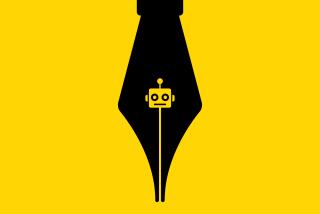A Truer Test of Skills : Great Western uses a high-tech screening process to achieve a more lasting fit of worker to job.
Job interviewing has gone high-tech.
Instead of just talking with a manager, job-seekers sit down at an interactive computer with CD-ROM, a touch screen and a microphone, and are tested for what the employer has identified as the basic and essential skills for the job.
Job candidates can rewind the job interview--go back over a question and answer it in a new way, rerecording their audio response. They also get a chance to ask a variety of preset questions of people already in the job about the realities of the role and the responsibilities for which they are applying.
At Great Western Bank in Chatsworth, such a multimedia interview was successfully piloted last year to select tellers, and is being expanded nationally to other branches, said Michele Maddock, a first vice president with the bank. The systems are designed to provide employers more consistent, job-relevant information about candidates, reduce interviewing costs and diminish turnover.
Every job-seeker gets exactly the same questions, hypothetical situations, teller-relevant math problems--even the same ornery and demanding mock customers to calm.
“It’s a level playing field for applicants,” Maddock said. “And the pilot we did showed we reduced teller turnover within the first 90 days after hire by 26%.”
The 20-minute automated job interview opens with a computer greeting: “Welcome to the interactive assessment aid.”
To begin, the applicant touches a label on the screen, and is then warned that the computer will be keeping track of response time and mistakes. Then the computer tests the interviewee’s money and computation skills--asking, for example, how to cash a check for $192.18, including at least three $5 bills and $2 in quarters. The computer confronts the job candidate with tough customers, including an angry man and a frustrated woman.
The system used by Great Western Bank was designed by Learning Systems Sciences in North Hollywood, a producer of multimedia training systems.
“The advantage of the computer interview is that it is blind to age, color, ethnicity, religion, and it shows whether the applicant has the basic skill set to be likely to succeed,” said John King, vice president of Learning Systems Sciences.
A big benefit of the multimedia interview is that it allows job seekers to ask risk-free questions about the work that they might be hesitant to pose in a live interview, King said. “What’s the toughest part of the job? What is working in a bank really like? It gives the candidate a chance to ask the hard questions,” he said.
*
In Great Western’s multimedia screening system, the answers about the work are honest, King said. “It was hard to get the script approved by the bank, but our argument was: Why deceive people into thinking the job is always terrific?” To reduce turnover and get a good fit of worker to the job, questions have to be relevant and the candidate has to have a realistic understanding of daily work, King said.
Being interviewed by a computer could seem daunting, impersonal, even cold. Scott Michalek, a financial services representative at the Van Nuys branch, well remembers his own 1993 interview.
“I came in and started to talk with them, and they told me I’d be taking a test on the computer. I had done nothing like it before, and I was a little scared at first,” he said. But he found he could work at his own pace and gradually the video customer experiences seemed real enough.
King’s advice for succeeding is simple: Apply past experiences, stay calm, pretend the mock situations are real and don’t hesitate to rewind and redo a question to improve the response.
Maddock sees one big downside for job-seekers to the multimedia interview. “Typically, a lot of people get hired because they interview well. With this system, traditional interviewing skills will not be enough.”
More to Read
Inside the business of entertainment
The Wide Shot brings you news, analysis and insights on everything from streaming wars to production — and what it all means for the future.
You may occasionally receive promotional content from the Los Angeles Times.








